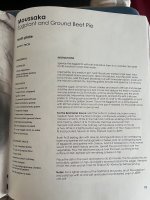k_tsoukalas
Administrator
One of my favorite Greek dishes is Moussaka, but I don't make it at home a lot. One of the issues is that I haven't found a great recipe, and I know that working with eggplant can be tricky. In the past, people have tried to explain to me how to make it, but their explanations have been confusing. I need a proper recipe that is easy to understand. It looks like Chef Pemi put together a great version of it that even someone like me, who has been intimidated by making my own moussaka, can follow. Not only that, but it looks yummy!
Check out the Cooking Greek Cookbook by Worldwide Greeks out on Hardcover, Paperback and eBook here!

Check out the Cooking Greek Cookbook by Worldwide Greeks out on Hardcover, Paperback and eBook here!

Last edited by a moderator:



